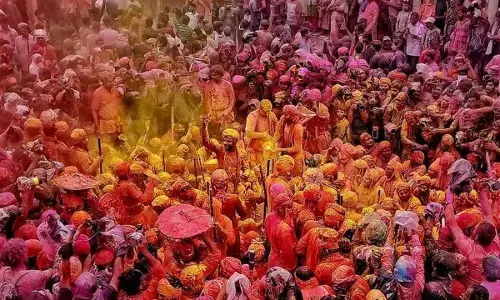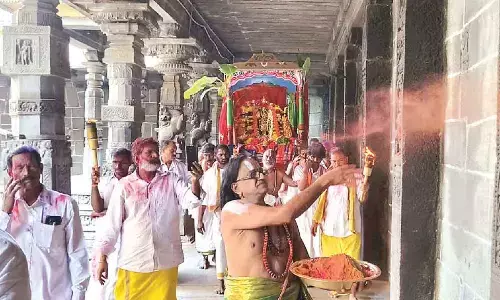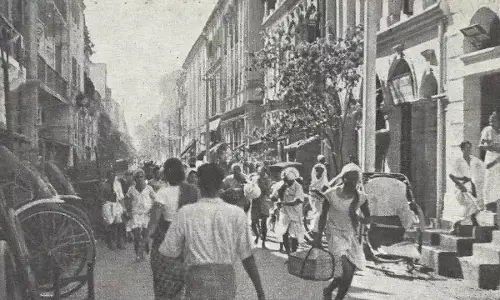Quarantine: An affliction or a bouquet of opportunities?
 Quarantine: An affliction or a bouquet of opportunities?
Quarantine: An affliction or a bouquet of opportunities?The word, ‘quarantine’ found its origin in Italy, coincidentally and ironically the country which was the first to register the maximum number of coronavirus cases in the present times
The word, 'quarantine' found its origin in Italy, coincidentally and ironically the country which was the first to register the maximum number of coronavirus cases in the present times.
The current definition of the word refers to the restriction on the movement of people and goods, which is intended to prevent the spread of disease or pests.
This Italian term, has its origin in the Latin term, 'quadraginta', which means 'forty'. The term came from the 14th century (1377) Venetian policy of keeping ships away from plague-stricken countries, by waiting at the port for 40 days to make sure that no remaining cases were aboard.
It is believed that the 40-day quarantine eventually became the norm because of its religious significance — Jesus fasted in the wilderness for 40 days, and Noah's biblical flood was caused by rain that lasted 40 days and 40 nights in the early 15th century.
The word 'quarentyne' was used to describe the desert where Jesus Christ spent 40 days and nights fasting.
Later, in the 1520s, the English word meant 'period of 40 days in which a widow has the right to remain in her dead husband's house'. The word was used a verb in the 1880s as 'quarantined' and 'quarantining'.
And in the present times, due to the coronavirus outbreak, the word is everywhere in 2020! In the current day Italy, to which the root of the word can be traced, 16 million people in the north, including Milan, have been quarantined and anyone who breaks free from the quarantine now faces three months in jail in Italy.
And the present corona quarantine and lockdown have been stifling to many as they feel that it is trying and unproductive.
But a stroll down the lane of history is enough to make you come vis-à-vis several heroes of quarantine who created history during the tough times of quarantine and isolation.
These luminaries and their amazing stories of creativity and inspiration never cease to amuse and inspire us. And here they come to enthuse and inspire you all!
Science: The first luminary who comes to mind is none other than Isaac Newton.When the Great Plague of London ravaged London starting in 1665, Isaac Newton was a student at Trinity College, Cambridge.
He retreated to this family farm approximately 60 miles away from Cambridge for 18 months during which he seemed to have come up with a discovery that is integral to our understanding of planets and stars throughout the universe — via astronomical spectroscopy and also the rules of 'fluxions', now known as calculus besides the most famous Theory of Gravity.
Literature: Shakespeare needs no introduction and he wrote three of his most acclaimed tragedies viz., King Lear, Macbeth, and Antony and Cleopatra while in quarantine.
Shakespeare experienced many periods of plague during his life and throughout some of his most productive times, the city of London shut down to bubonic plague outbreaks.
If we go further down the history, we find Boccaccio who deserves recognition because he was producing great works during the Plague—the Black Death in 1348 which killed his father and stepmother.
In the years after the outbreak, he wrote his best-known work, a novella called The Decameron. It is about ten young people who flee the 1348 Florence plague and spend two weeks in the countryside.
Boccaccio even divides the novella by noting each day his characters spent in quarantine ("Day 1, Day 2," etc.) just like what a lot of people are doing now!
Another interesting quarantine contribution came the poet Shelley's wife, Mary Shelley during a cholera epidemic in 1816.
While in isolation they read ghastly horror stories to pass the time which eventually led to the birth of Mary Shelley's classic gothic horror sci-fi novel, Frankenstein, a first of its kind.
Painting: The much talked about painting, 'Human Frailty' was painted by Salvator Rosa during the 1656 plague outbreak that struck Naples hard in which he lost his son and two of Rosa's siblings.
Bapu, Baba Saheb & Madiba: When Mahatma Gandhi left Bombay along with Kasturba and the two children, on reaching the shore of Durban after 18 days the people on board the ship were not allowed by the South African Medical Board to land as the plague spread had started in Bombay two months ago.
Because of the Quarantine Act they needed to wait for five more days in order to complete the 23-day period of quarantine before they landed.
Gandhi while writing about his then quarantine experience highlights the importance of qualities like patience, hope, tolerance and courage which alone helped them stay calm and wade through the hard times.
While the quarantine has been a moment of artistic inspiration for some, and a moment of motivation to better oneself through the cultivation of better qualities, values and newer skills, for some others it is an epiphanic moment as it was for BR Ambedkar which helped him define clearly the agenda behind the practice of 'untouchability'.
In Who Were the Untouchables? he wrote, "It is a case of territorial segregation and of a cordon sanitaire putting the impure people inside a barbed wire into a sort of a cage."
The significance of the meaning of the French phrase, cordon sanitaire becomes evident when we look at its usage in the most recent and current corona context: it refers to roping off a whole community, which might contain sick and unhealthy people and prevent anyone from leaving in order to curb the spread of a disease.
It is common to get drowned in gloomy thoughts when one is powerless as in times of quarantine. But people like Nelson Mandela turned his quarantine like solitary confinement at the notorious Robben Island prison into a University of Opportunity to educate himself and get a Law degree at the age of 71.
His "Long Walk to Freedom" will give one one's life goals for sure: it reveals strategies to turn challenging situations like the present-day quarantine into a once-in-a-lifetime learning opportunity, no matter how old or young you are!
It is not just humans who can be smart enough to shape calamities into opportunities for betterment, but a Vanara like Sugriva too has a lesson for us! and wide into the forests in different directions and used to return home leisurely studying the surroundings in detail and used these periods of isolation to master the geography of the kingdom of Kishkinda.
And we all know how valuable his geographical knowledge proved to be for Rama in tracing Sita after Ravana abducted her!
Hope you all are sufficiently inspired now to make your mark in life!
(The writer is former Vice Chancellor, Adikavi Nannaya University, Rajahmundry)








